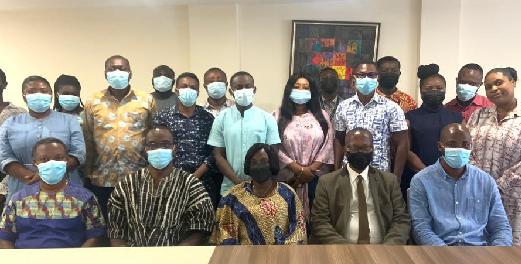
GJA, UNESCO develops manual on migration reporting
The Ghana Journalists Association (GJA), in partnership with the United Nations Educational, Scientific and Cultural Organisation (UNESCO), is developing a manual on migration reporting to enhance the work of media practitioners.
Aside from the development of the handbook on migration reporting, the GJA, under the project, would also spearhead the setting up of migration desks in some selected media houses.
Advertisement
Speaking at a two-day workshop to draft the manual at Aburi in the Eastern Region last Thursday, the President of the GJA, Mr. Roland Affail Monney, said the development of the guidelines on migration reporting would help journalists in their work to report accurately on issues bordering on migration to educate the public.
Tackling social issues
He said the project would give more meaning to "solution-oriented journalism" and also be a break from excessive politics that had currently characterised the media space to the neglect of other critical social issues such as migration, unemployment and insecurity.
He added that the focus of the media would not only be sharpened to concentrate on migration but also resolve the lingering issues of migration and media.
Mr. Monney commended UNESCO for supporting activities of the GJA over the years, saying that the project was an opportunity to foster stronger collaboration that would ensure the rolling out of more programmes for the benefit of the Ghanaian media and Ghanaians in general.
Changing the narrative
A senior lecturer at the Centre for Migration Studies at the University of Ghana, Dr. Mary Boatema Setrana, who joined the meeting via the Internet, urged the media to shift its attention from highlighting only the negative aspects of migration to the positive contributions it had made to the national economy.
According to her, the media should begin to project the positive aspects of migration that has contributed to the socio-economic development of the country to change the narrative of irregular migration.
“The dominant narrative has been that migration has been negative. Migration is from Africa to Europe and it is through the use of boats and people dying while on the high seas but statistics indicated that it was a handful of people who resorted to that means of travel," she said.
Dr. Setrana, in her presentation, said statistics had shown that there had been more increase in continental or sub-regional migration than international by Ghanaians.
She said as a result of strict migration laws in European countries, some Ghanaian migrants resorted to transiting to countries such as Libya, Morocco and Mali where they worked to earn some money or built the right networks to continue to Europe.
“Unfortunately, media reportage has been on irregular migration through Libya and Morocco to Italy without focusing much of their reports on statistics of what the real experiences were,” she said.
Dr. Setrana, therefore, called on the media to change that negative narrative by focusing on the positive side of migration and the fact that people were moving within the sub-region rather than Europe.
The meeting
The meeting brought together experts in the field of media training and practitioners to develop the document to help journalists report effectively on migration.
The development of the manual on migration reporting formed part of a project being implemented by the GJA, in partnership with UNESCO, that would also lead to the setting up of migration desks in some selected media houses.




